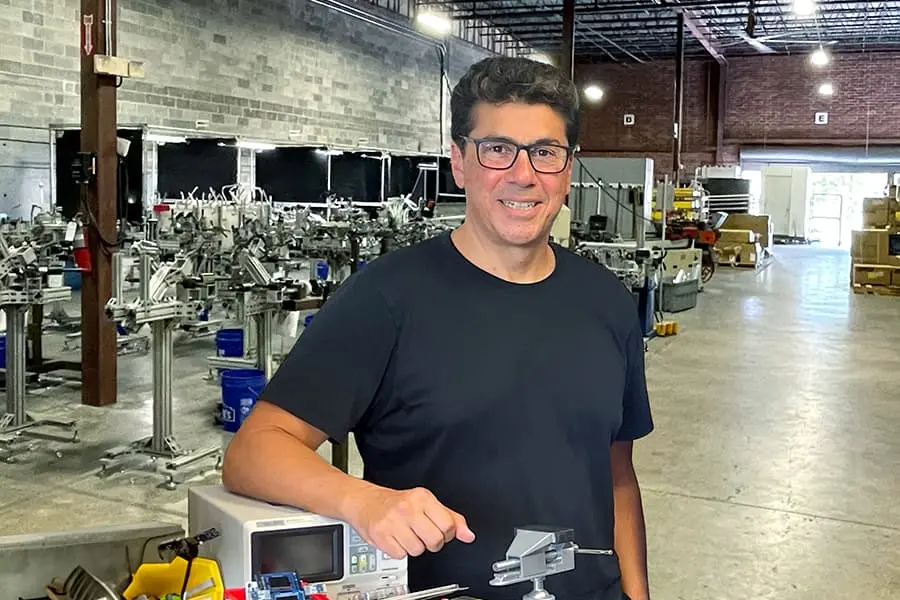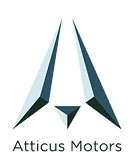
Products With a Purpose
CMU alumnus Paulo Camasmie wants to help everyone live their best possible lives
By Kelly Rembold
When Carnegie Mellon University alumnus Paulo Camasmie dreams up a new product, he does it with a singular goal in mind — to improve lives.
That was his focus when he founded Catrike, a bike company that makes recumbent trikes for riders of all abilities.
It was a major factor when he developed Atticus, an autonomous electric car prototype.
It’s now the driving force behind Nino, an autonomous general-purpose personal assistant. Reminiscent of Rosie from “The Jetsons,” Nino will be programmed to help people with everyday tasks around their house or office.
“I want to make a robot that can help people spend more time on the things that matter most to them,” says Paulo, a 2020 School of Computer Science graduate who earned a master’s degree in robotics systems development.
“I was dealing with noise, potholes and pollution during the walk, and I thought that we should leave Brazil, even if it was only for a few years. That’s when I had the epiphany that I could make bikes for a living. I knew I could create an ultra-comfortable and innovative bike with a minimalist design.”
Paulo Camasmie (SCS 2020)
Pedaling a New Path
Paulo founded Catrike in 2000. He and his family had just moved to the U.S. from Brazil, so that he could start a bike company.
He had no prior knowledge of the industry, and many people questioned his decision.
“Everyone thought I was crazy in Brazil,” Paulo says. “We left everything behind. All we took with us were five pieces of luggage and our educations.”
The move was difficult, but it was the right choice for Paulo, his wife, Rafaela, and their children, who were ages 1 and 2 at the time.
Paulo received a bachelor’s degree in mechanical engineering from FAAP in Sao Paulo, Brazil, in 1992. He completed a five-month internship at Chrysler in Detroit and returned to Brazil to start his own import and export company. The business was successful, but Paulo felt out of his element and unchallenged by the work.
“I had this desire to go back to using my engineering skills,” Paulo says. “I wanted to explore my full potential.”
While out for a stroll in Sao Paulo with his daughter, he had an epiphany.
“I was dealing with noise, potholes and pollution during the walk, and I thought that we should leave Brazil, even if it was only for a few years,” Paulo says.
When they returned to their building, Paulo noticed a beautiful bike in the building’s garage.
“That’s when I had the epiphany that I could make bikes for a living,” he says. “I knew I could create an ultra-comfortable and innovative bike with a minimalist design.”
He told Rafaela to go look at the bike.
“When she asked me what I was thinking about, I said ‘We can move to the U.S., and I can start a bike company,’” Paulo says.
She was on board, and they were off.
“I was designing and making the bikes, selling them, running the books, paying the bills — just totally bootstrapping the operation. It was very hard.”
Paulo Camasmie
An Uphill Climb
Paulo’s original plan swerved quickly when he learned about recumbent trikes. Recumbent trikes have three wheels, and a low profile that allows the rider to sit in a reclined position. They are easier to pedal and can be more comfortable than traditional bikes.
He set out to design and build the best recumbent trike on the market. He wanted it to be easier to ride, more comfortable and more affordable than the competition. It was an ambitious goal.
“I was designing and making the bikes, selling them, running the books, paying the bills — just totally bootstrapping the operation,” Paulo says. “It was very hard.”
Paulo’s work paid off, and Catrike’s sales grew.
Looking back, he says his engineering skills helped him stay the course.
“I had the perspective of an engineer, not a cyclist, which helped my company because I made decisions that made sense for the product,” he says. “I came without any bias. I just came to succeed and make trikes.”
Today, Catrike offers eight different recumbent trike models and electric assist options and has earned six Trike of the Year awards from BentRider Online. The company produces more than 5,000 trikes annually.
“I was visiting an aluminum extrusion plant in Michigan and sitting next to a plant manager from Honda on the bus. We were talking about production output. She was telling me about the number of cars they made per day, and it was so overwhelming. I had a vision that the world didn't need more cars.”
Paulo Camasmie
Coasting On
Paulo took a step back from Catrike in 2015. The company was flourishing, and he was ready to pursue his next product — an autonomous electric car named Atticus. Paulo’s sister, who was in a serious car accident when she was age 19, inspired Atticus. Paulo wanted to build a safe, sustainable car that used autonomous technology to prevent similar accidents.
“I imagined a better future where there's no accidents or people getting hurt,” he says. “I figured I should get into the auto industry and make an autonomous car.”
The prototype was completed in 24 months, and Paulo began exploring ways to bring Atticus into production when he had his next epiphany.
“I was visiting an aluminum extrusion plant in Michigan and sitting next to a plant manager from Honda on the bus,” he says. “We were talking about production output. She was telling me about the number of cars they made per day, and it was so overwhelming. I had a vision that the world didn't need more cars.”
He decided to put Atticus on the back burner and shift his focus to something new — robotics.
“I knew I was prepared academically, but I wasn’t a typical undergrad college student. But I had a lot of experience and a lot of passion. I knew what I had in me. It was amazing that Carnegie Mellon's admissions also saw that. I think that says a lot about CMU. They look at the candidate as they are.”
Paulo Camasmie
Switching Gears
Paulo started researching graduate schools.
He reached out to Carnegie Mellon and received an encouraging reply from the Robotics Institute’s academic program manager Sarah Conte, who said he seemed like the perfect candidate for the program.
“She was responsible for giving me the courage to apply,” Paulo says.
To his surprise, he was accepted.
“I knew I was prepared academically, but I wasn’t a typical undergrad college student,” he says. “But I had a lot of experience and a lot of passion. I knew what I had in me. It was amazing that Carnegie Mellon's admissions also saw that. I think that says a lot about CMU. They look at the candidate as they are.”
For Conte, Paulo’s enthusiasm was immediately obvious.
“His drive is unmatched,” Conte says. “He is a multiplier, so he consistently empowered his project teammates and his entire cohort.”
On campus, Paulo sought as much hands-on experience in robotics as possible.
“I took every class that I could on manipulation, control and hardware,” he says. “I gravitated towards classes that allowed me to build, control and play with robots.”
He founded his third company, Symbol Robotics, in 2023. He describes Symbol as “a robotics company that people can trust” with a blend of modern and traditional artificial intelligence.
Nino will be Symbol’s first robot, and Paulo has been working on the prototype since 2020.
He hopes the robot and the company will bring positive change to the world.
“I want Symbol and our robots to be a symbol of integrity, a symbol of values, a symbol of using technology for good,” Paulo says. “This is going to be the work of my life.”


